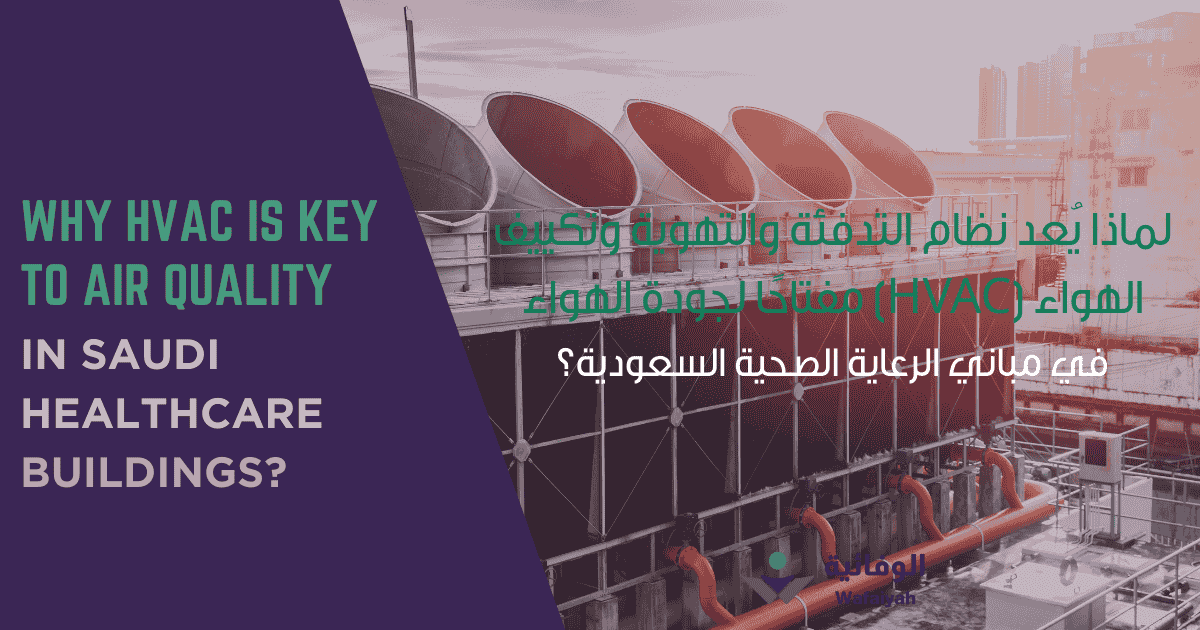Healthcare facilities in Saudi Arabia depend on reliable systems that guarantee clean, safe, and controlled environments. One of the most critical elements behind this is HVAC, Heating, Ventilation, and Air Conditioning. An advanced system ensures that patients, visitors, and staff enjoy fresh air, controlled temperatures, and reduced risks of airborne diseases. At Wafaiyah, we understand the central role HVAC plays in healthcare and how it directly impacts patient safety and well-being. In this guide, we explore why this system is the foundation of air quality in Saudi healthcare buildings.
Indoor air quality in hospital buildings is essential for giving comfort to patients and for lifesaving. Airborne infections are hazardous to patients, particularly those with compromised immune systems. A properly functioning system maintains a steady exchange of clean air and removes bacteria, viruses and other harmful particles. Moreover, the system allows controlling ventilation, temperature, and humidity, which makes the indoor environment safer and reduces the risk of infection. It helps to maintain healthy environments in hospitals in Saudi Arabia, where dust and heat are ever-present problems. Even the most modern medical procedures can become ineffective without proper systems because of polluted air.
Saudi Arabia’s Climate Demands Advanced HVAC Systems
The weather in Saudi Arabia is hot, dry, and usually dusty, which poses special problems to hospital facilities. The hospitals require clean air flow that would not expose patients to dust storms, high temperatures, or seasonal allergens. A dependable system cleans the air and helps the AC systems to stay stable against outdoor weather. Healthcare facilities must have accurate indoor conditions. This is important for surgical operations, patient healing, and the safety of equipment to have stable air control. With the help of modern systems, Saudi hospital providers can overcome the unfavourable conditions of the environment. This can help them to provide a cleaner and healthier ambience to all people within their premises.
Benefits of HVAC Systems in Saudi Healthcare Buildings
With time, the importance of installing systems in hospital buildings is becoming prominent. This is due to the following reasons:
- Infection Control and Disease Prevention
- Regulating Humidity and Temperature
- Removing Harmful Pollutants
- Energy Efficiency with Healthy Air
- Supporting Critical Care Environments
Let’s explain each benefit in detail below:
Infection Control and Disease Prevention
Airborne pathogens are a significant threat in hospital facilities. High-tech systems filter, disinfect, and regulate air circulation to reduce cross-contamination. These systems are essential for reducing hospital-acquired infections and protecting sensitive patients, staff, and visitors against airborne illnesses.
Regulating Humidity and Temperature
It is vital to ensure that the patients recover and feel comfortable in the right climate in the building. These systems control humidity to stop the development of molds and keep areas sterile. In the extreme heat of Saudi Arabia, effective cooling brings a sense of comfort. It also eliminates the risk of failure of medical equipment, thus increasing the effectiveness of operations and improving the health of patients at the same time.
Removing Harmful Pollutants
There are several air pollutants produced in hospitals, such as chemical residues, anaesthetic gases, and microbial contaminants. These harmful particles can be eliminated by systems that have advanced filtration. Healthcare facilities in Saudi Arabia can reduce volatile organic compounds and fine dust to create safer and cleaner indoor air. This eventually enhances patient recovery, as well as the performance of staff.
Energy Efficiency with Healthy Air
Energy-efficient systems have excellent indoor air quality controls. An efficient system reduces energy usage and yet provides sterile, filtered air. This twofold advantage reduces operational expenses of hospital facilities without any impairment of safety. This also meets the benefit of sustainability and enhances the long-term hospital infrastructure.
Supporting Critical Care Environments
Highly specialized areas of the hospital such as operating rooms, ICUs, and isolation wards require a high degree of air control. Modern systems provide laminar airflow and pressure control. It supports continuous filtration to protect patients undergoing surgeries and intensive care. Such accuracy in the Saudi hospital environment will guarantee standards of excellence on a global level.
The Role of Regular HVAC Maintenance in Hospitals
Even the most advanced systems will stop working normally without regular maintenance. To ensure the indoor air quality, make sure you replace the filters when needed. Ducts should be cleaned to maintain balanced airflow regularly. Failing to maintain the system in healthcare may lead to polluted air, risking the health of patients, and increased energy expenditures. The Saudi healthcare facilities should focus on maintenance schedules that will guarantee health standards. Collaborating with reliable service providers will ensure that the systems operate efficiently throughout the year. Frequent checkups help avert the failure of the system during peak hours. This ensures that patients are safe, and the costs are controlled. Installation is as significant as proper maintenance of the air quality in the hospital.
Modern Technology Innovations in HVAC for Healthcare
The HVAC industry is growing with smart technologies that ensure safer and more efficient hospitals. New sensor systems are installed that measure the air quality in real time and automatically regulate the level of ventilation. AI controls help in the balance of airflow, energy consumption, and healthy interior environments. These innovations are changing patient care in Saudi healthcare buildings, as they allow an accelerated response to changes in the environment. One of the advanced filtration techniques is the use of HEPA filters and UV light technology that inactivates the harmful microorganisms. These modern systems make it possible to keep Saudi hospitals at the forefront of hospital infrastructure with the help of constant improvements.
Meeting International Standards in Saudi Healthcare Facilities
In Saudi Arabia, hospital buildings are designed according to international standards of safety and cleanliness. Organizations such as ASHRAE (American Society of Heating, Refrigerating and Air-Conditioning Engineers) establish the standards that hospitals should achieve to provide air quality. These systems are built to meet these standards so that patients can be taken care of in facilities as good as international hospitals. With these standards, the Saudi hospital facilities demonstrate their interest in providing patients with world-class care. HVAC is not only a basic service in the building, but also a representation of high-quality hospital provision in the area.
Partnering with Experts for Better Healthcare Air Quality
HVAC systems in hospitals are installed and managed with expertise. Each hospital has its demands, and only the specialists can develop systems that address the needs. At Wafaiyah, we offer customized systems that are safe, efficient and meet the standards of hospitals. All the way to maintenance and upgrade, we assist Saudi hospital facilities to operate with the best air quality. Hospitals save their patients, enhance comfort, and increase the life span of their equipment by collaborating with skilled partners. Reliance on experts will guarantee that the quality of air is never affected, which will make the healthcare settings safer for all.
Conclusion
Air quality is the foundation of safe and effective hospitals, and HVAC systems are at the heart of it. In Saudi Arabia, where climate challenges are constant, hospitals must invest in reliable solutions to protect patients and staff. At Wafaiyah, we are dedicated to delivering world-class services that ensure healthier, cleaner, and safer environments. With the right systems in place, healthcare facilities can achieve excellence in care.
Frequently Asked Questions
1. Why is HVAC critical in Saudi hospital buildings?
The system ensures clean, controlled air circulation, protecting patients, staff, and equipment from dust, heat, and airborne diseases.
2. How does HVAC reduce infection risks in hospitals?
It filters pathogens, controls airflow, and supports negative pressure rooms, preventing the spread of airborne infections.
3. What role does climate play in Saudi hospital HVAC design?
Saudi Arabia’s hot and dusty climate requires advanced systems that filter pollutants and regulate air quality year-round.
4. How often should hospital HVAC systems be maintained?
Regular inspections and filter replacements should be done at least quarterly, with specialized checks for sensitive hospital areas.

